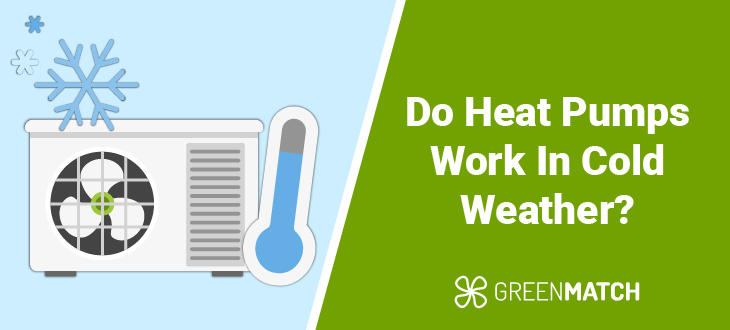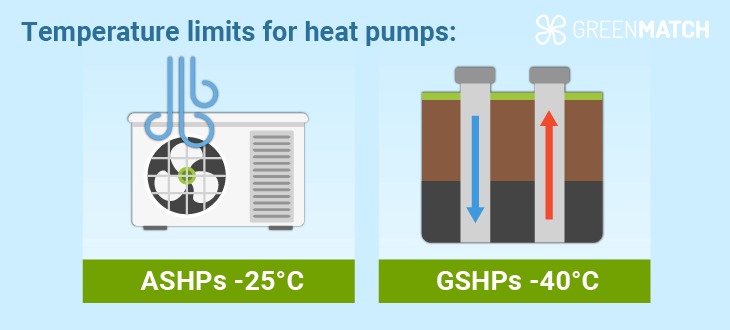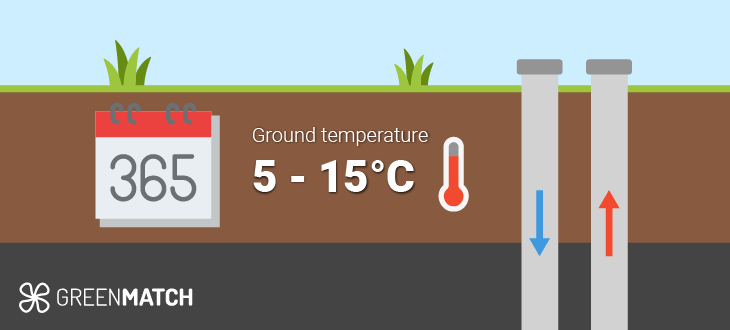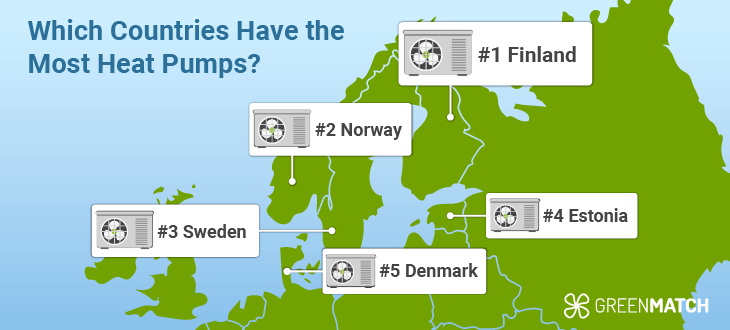Answer these simple questions and we will find you the BEST prices
Which type of solar quotes do you need?
It only takes 30 seconds
100% free with no obligation

Get up to 4 quotes by filling in only 1 quick form

Install a heat pump for less with the BUS grant

We’ve helped over 500,000 homeowners reduce their carbon footprint
- GreenMatch
- Heat Pumps
- Do Heat Pumps Work In Cold Weather?
Do Heat Pumps Work In Cold Weather in the UK?


- Air source heat pumps operate at temperatures between -25°C and 35°C.
- Ground source heat pumps can function between -40°C and 60°C.
- Air source heat pumps are usually up to 300% efficient in optimal conditions, whereas in colder weather their efficiency can drop to 100%.
It’s no secret that heat pump efficiency is affected by the weather when it comes to air source heat pumps. So, before looking to install a heat pump in the UK, you will want to answer the question: “Do heat pumps work in cold weather?” The short answer is yes. The longer one is that while they can function, you may notice decreased efficiency and energy output in lower temperatures.
In this guide, we’ll describe how heat pumps work in winter, how their performance may be affected, and whether it’s worth getting a heat pump in the UK knowing that you’ll want to use it during the colder months. If, by the end, you still have questions about using heat pumps in winter, you should consult a heat pump specialist for more clarity and peace of mind.
Looking for installers on your own can stretch on for hours or even days. Fortunately, we’re here to help you save your precious time. Just fill in our 30-second form and we’ll have up to 4 reputable installers from our network reach out to you. Simply click below to get started now!
- Quotes from local engineers
- Payment by finance available
- Save £7,500 with BUS grant
It only takes 30 seconds



How does a heat pump work in winter?

In winter, a heat pump works by extracting heat either from the air (in the case of an air source heat pump) or from the ground (if you have a ground source heat pump) and transferring it into your home.
When it comes to air source heat pumps, they work by extracting heat from the outside air and using it to warm up a refrigerant that turns into vapour that is then transferred into your home to release heat. If you have an air to air heat pump, the heat will be distributed via a fan ventilation system, whereas with an air to water heat pump, warm air is used to heat up water that is then transported to your radiators and taps.
If you’re wondering: “Do air source heat pumps work in winter?” you’ll be glad to know that the answer is yes. Air source heat pumps can operate efficiently in temperatures as low as -25°C. This is because they work by absorbing the heat created by the movement of atoms and molecules through air, which occurs even at low temperatures.
You can also opt for a water source heat pump system, which uses a nearby body of water—like a lake, river, or underground aquifer—as a heat source. These systems tend to perform well in winter because water temperatures are generally more stable than air.
Ground source heat pumps, on the other hand, are hardly affected by cold temperatures. They can work efficiently at temperatures down to -40°C. This is because they extract heat from the ground and use it to warm up water that can supply your radiators, taps, and underfloor heating.
Since ground temperatures remain fairly consistent year-round (between 5 to 15°C), ground source heat pumps can keep working efficiently even in extremely cold winters.
Do air source heat pumps work in cold weather in the UK?
Yes, an air source heat pump works during the colder months in the UK. In recent years, winter temperatures in the UK have ranged from 0 to 7°C. Below freezing temperatures have been a rare occurrence, so you shouldn’t typically notice a huge impact of the colder weather on your air source heat pump.
Under the right conditions, an air source heat pump can reach efficiency levels of up to 300%. This means that for each unit of electricity the heat pump consumes, it generates 3 units of energy. However, once temperatures reach -25°C, air source heat pump efficiency levels can drop to 100%, meaning that they only generate 1 unit of energy per unit of electricity used.
While this may seem like quite the drop, it’s worth considering that an air pump’s efficiency level in cold weather is comparable to the efficiency of a gas boiler, which is typically about 95%. Nevertheless, it’s important to note that you may notice that your electricity bill is higher in winter than during warmer months, as your heat pump may become overworked to meet your heating needs.
Air source heat pump problems in cold weather in the UK
While UK winters have been mild for the past few years, it’s important to be aware of the potential issues an air source heat pump can face during below freezing temperatures. These include:
- Decreased efficiency: At low temperatures, air source heat pumps have to work harder to extract heat from the colder air, resulting in lower efficiency rates. However, this tends to occur only when temperatures get closer to -25°C, which doesn’t generally happen in the UK.
- Frost buildup: During cold weather, air source heat pump units can get covered in snow and frost. You don't have to worry as long as you only notice these elements on the top part of your unit. However, if you notice ice reaching the insides of the heat pump’s coil, you should have a professional check your unit for potential damage.
- More frequent defrost cycles: Defrost cycles are a part of an air source heat pump’s operation that allows the outdoor coil to remain free of frost, which can inhibit its performance. In this process, indoor heat is used to defrost the coil. If temperatures are really low, your heat pump will defrost more frequently, which increases their energy consumption.
- Potentially reduced energy output: You may notice that your system cannot meet your household’s energy needs quite as well in winter. This is why choosing the right heat pump size is important, as it helps you avoid potential energy loss during colder weather. Additionally, you can consider installing a hybrid heat pump (consisting of an air to air heat pump paired with a gas boiler) to ensure that your heating and hot water demands can be consistently met in winter.
- Increased electricity usage: In below freezing temperatures, your air source heat pump may work overtime to keep up with your energy needs. As a result, it’s possible that it uses more electricity than it does during warmer months to produce the same amount of energy. If you notice that your electricity bills increase significantly in winter, be sure to consult a specialist to be sure that your heat pump isn’t damaged and, therefore, using more electricity to function.
Need more advice about whether a heat pump would be suitable for your UK home? Then you should consult a professional who can offer you tailored advice. By clicking below and filling in our 30-second form, you can get in touch with up to 4 local heat pump installers in no time. It’s quick, easy, and completely free!
- Quotes from local engineers
- Payment by finance available
- Save £7,500 with BUS grant
It only takes 30 seconds



Do ground source heat pumps work in cold weather in the UK?

Yes, ground source heat pumps work well even during the colder months. This is because, unlike air source heat pumps, which are affected by the temperatures of the outside air, ground source heat pumps operate by extracting heat from the ground, which has a stable temperature ranging from 5 to 15°C year-round.
You’ll only notice the impact cold temperatures have on your heat pump if they reach -40°C, which is highly unlikely in the UK. So this means that if you’re ready to invest in a ground source heat pump, you’ll be able to enjoy consistent heating and hot water regardless of the season.
Is a heat pump worth it in cold climates?

Yes, even in cold climates such as in Northern Europe, heat pumps are a popular choice among homeowners! It might seem surprising to you, but cold weather doesn’t stop them from installing heat pumps for their homes.
According to the European Heat Pump Association, countries such as Finland, Norway, and Sweden are actually at the forefront of the domestic renewable energy movement, despite the frequent below freezing temperatures that occur there in winter.
As we’ve mentioned in this guide, even though air source heat pumps lose some of their efficiency during the winter months, investing in one is still worth it. This is because even at their lowest efficiency levels in cold temperatures, they perform as well as - if not better than - a traditional gas boiler.
This means that your air source heat pump will still be able to attend to your home’s energy needs even during the coldest part of the year, but it might use up more electricity than you’re used to in the process. A ground source heat pump, on the other hand, will be largely unaffected by colder outside temperatures, so you can count on it to provide consistent heating in winter.
Should I get a heat pump in the UK's cold climate?
Since the UK generally has mild winters that barely reach freezing temperatures, installing a heat pump is a good idea, as you will not notice too much loss of efficiency in colder weather. So, if you’re looking to reduce your yearly heating bills and carbon footprint, it’s worth seriously considering investing in a heat pump.
Ready to join the thousands of homeowners in the UK who have reaped these benefits? Then you’re probably itching to know more about how much a ground or air source heat pump costs or whether you can apply for a heat pump grant to avoid breaking the bank with your investment in renewable energy. Instead of wasting hours looking for answers to all your heat pump questions on your own, why not consult a professional?
With our quick and free service, you can get in touch with up to 4 local heat pump installers in no time. Just fill in our 30-second form, and we’ll connect you with reputable professionals from our network in no time. So, what are you waiting for? Start your renewable energy journey today by clicking below!
- Quotes from local engineers
- Payment by finance available
- Save £7,500 with BUS grant
It only takes 30 seconds



FAQ
Heat pumps can work in winter at temperatures above -40°C. For an air source heat pump, temperatures of -25°C and below are too cold for them to operate in. Ground source heat pumps, on the other hand, can still work at those temperatures, with -40°C being too cold for them to operate.
Yes, air source heat pumps work in the UK in winter! This is primarily because the UK’s winters tend to be mild, so the efficiency of an air source heat pump isn’t that severely affected by the weather here.
Heat pumps are still efficient in colder temperatures, even though their efficiency levels may drop from 300% to 100%. In winter, a heat pump’s performance is similar to that of a gas boiler, but it comes without the carbon emissions of this traditional heating system.
Yes, a heat pump can run continuously during the winter months. This way, you can ensure that the temperatures in your home remain comfortable. However, if temperatures are really low, there are some potential problems that may arise by running an air source heat pump in winter that you should be aware of.
Yes, air source heat pumps have a defrost cycle. This ensures that the coil in the outdoor unit remains free of any frost that can affect its energy production. That said, there are some issues that may arise when it comes to how often defrost cycles occur in low temperatures.

Sabria Schouten is a content writer who aims to make information about sustainable energy broadly available. She believes that knowledge about how to lead a greener lifestyle should be easily accessible to anyone.
We strive to connect our customers with the right product and supplier. Would you like to be part of GreenMatch?

